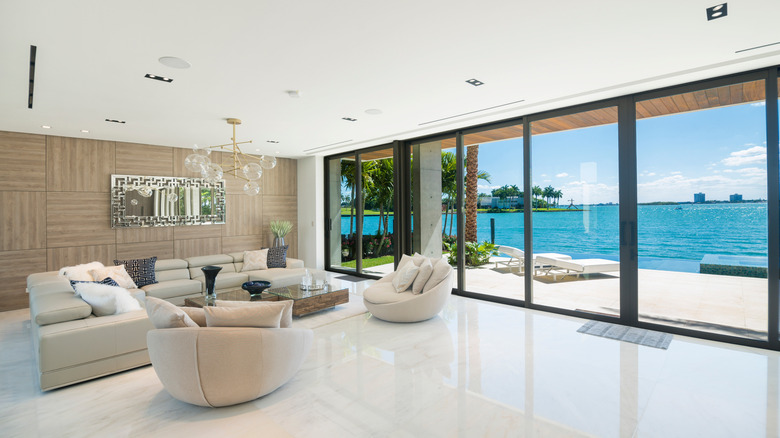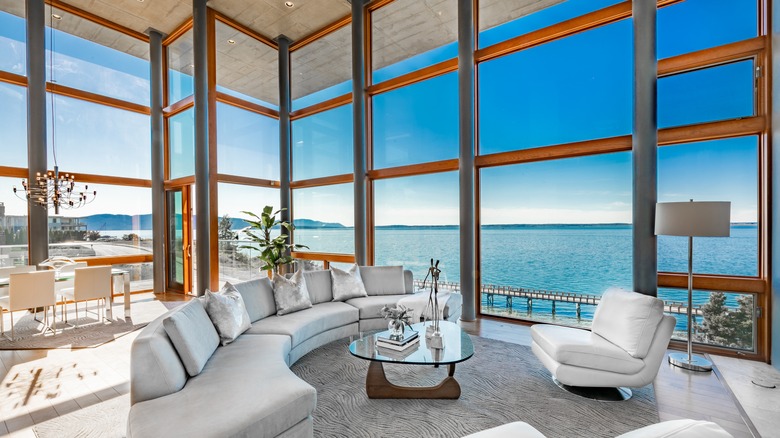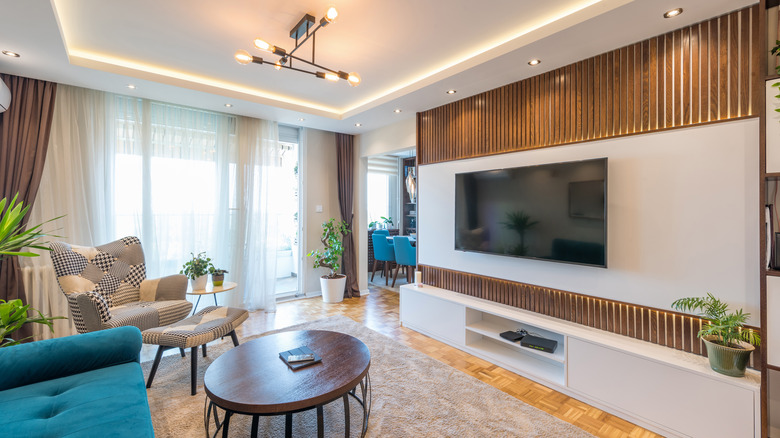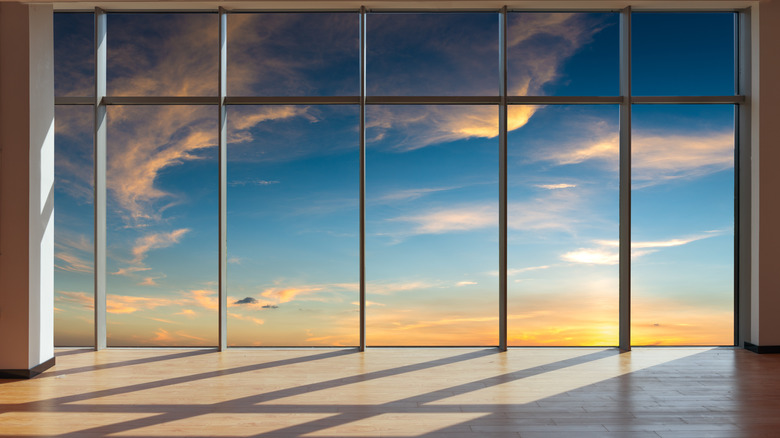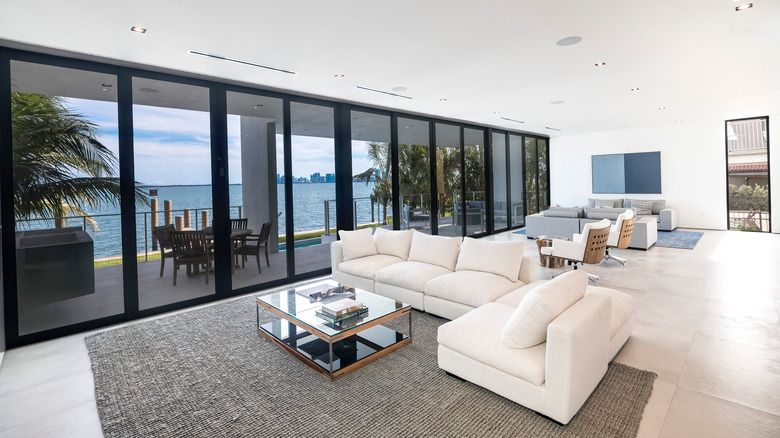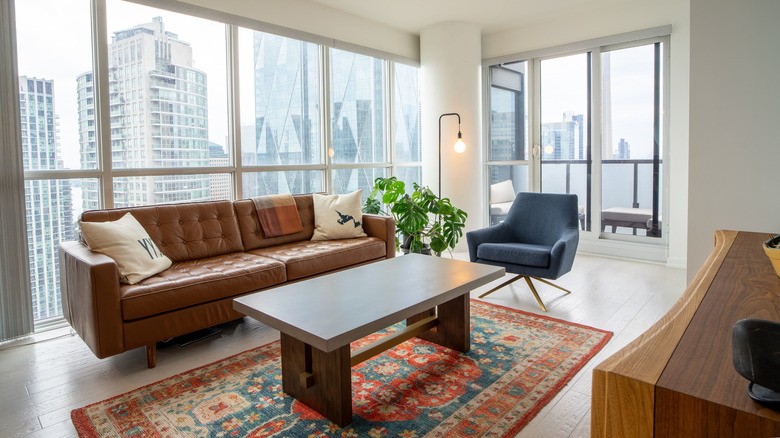Are Floor-To-Ceiling Windows Worth The Hype?
Modern architecture inclines toward the use of glass for an elegant and luxurious touch. Consequently, floor-to-ceiling windows can elevate the appeal of even the most average of spaces. These massive glasses radiate their brilliant design detail, especially when positioned against a picturesque backdrop. Other than that, floor-to-ceiling windows increase the amount of natural light that gets into your home's living space, saving you a couple of dollars. You should know that lighting accounts for up to 4% of your total energy bills at home (per the U.S. Energy Information Administration).
With that being said, it is quite clear why floor-to-ceiling windows are quite popular among homeowners. No doubt there are a lot of benefits that come with this window type, but let's face it: Huge windows can be quite annoying. They are difficult to clean and can cause uncontrollable heat, especially during the hot summer months. So are the floor-to-ceiling windows worth the hype? To answer this question, we need to take a look at some of the pros and cons of installing floor-to-ceiling windows. So let's start with the advantages.
Plenty of natural light
A bright and airy space is not only appealing to the eyes but also has an optical illusion effect that makes smaller rooms appear bigger. Floor-to-ceiling windows are large enough to allow more natural light than other types of windows. As mentioned earlier, home lighting features add up to a significant amount at the end of the month; therefore, this particular type of window allows you to save on utility bills because you won't need to use light features quite as much. Other than saving a couple of bucks on utility, enough natural light in the living space has plenty of other health benefits as well.
According to Harvard Health Publishing, the most common advantage of moderate sun exposure is initiating the skin's production of vitamin D. While you can get vitamin D from food sources, sunlight is the best source, not to mention it is also readily available. Other than that, natural light has been associated with improving mood, aiding in better sleep, and also warding off some health complications associated with using fluorescent lights.
An abundance of fresh air
Fact is, there are plenty of toxins that we encounter in our day-to-day lives; while some are out of our control, indoor air quality is something that is within our control. According to the United States Environmental Protection Agency (EPA), indoor air in our homes or any other closed buildings might be more toxic or polluted than outdoor air. This is largely influenced by the plenty of air pollutants like dirty ducts.
Floor-to-ceiling windows are wide enough and easily operable, letting in a lot of fresh air. What's more, the wide operable windows also blur the line between indoor and outdoor living. Regardless of the location of your home, whether rural or urban setting, you will be able to enjoy the scenic views right from your living room as you also benefit from the fresh air coming through the windows. But while floor-to-ceiling panes are a delight to look at, they also have a few drawbacks.
Cost of installation
The major drawback when it comes to installing a floor-to-ceiling window is the cost of installation. Having these wall glasses doesn't come cheap; according to Fab Glass and Mirror, the average installation cost ranges between $800 and $1500 per square foot. The choice of the material and the scope of the entire project often influence this cost. While glass can be expensive, you may choose from affordable alternatives, including fiberglass and vinyl.
Other than the initial installation cost, you must also consider the cost of hiring a structural engineer, especially when you need to have a section of your wall removed. Angi mentions that the cost of hiring a structural engineer is approximately 20% of the entire project's budget, with a national average of $500. You should also be aware that the floor-to-ceiling window is quite restrictive when it comes to installation: It can only be installed on specific walls in the house.
Additional investment
Privacy is important as far as comfortable living is concerned. So unless you are totally secluded from the rest of the world, floor-to-ceiling windows alone have little to no promise of private life. Windows are transparent, and if you live in an urban setup amid many people, you need to invest further in secondary add-ons for your glass wall. To maintain some level of privacy, you will need both blackout and sheer curtains, drapery, and additional such features.
According to Allure Window Treatments, homeowners often don't think about how difficult it is to operate the hard-to-reach places on the floor-to-ceiling windows. This means that they must invest in automated shades and blinds or motorized drapery. Also, floor-length curtains are a must. So, if you care about keeping your privacy, you have to contend with having obstructed views which defeat the whole purpose of installing these types of windows in the first place.
Are floor-to-ceiling windows worth it?
Floor-to-ceiling windows are popular for all the right reasons, from improving your home's curb appeal to giving you unobstructed views from your living space. In addition, installing this window type is one of those home improvement options that also increase your property value when you need to sell. According to Glass Doctor, replacing your windows with energy-efficient options have a return on investment of 72%.
On the flip side, however, floor-to-ceiling windows have their fair share of challenges as well. For instance, they have high installation costs — not to mention the fact that maintaining such huge windows also poses a challenge. So are these windows worth all the hype? Well, the answer to this question varies from one homeowner to the other. If you have the money to splurge on such an expensive upgrade, installing floor-to-ceiling windows might be ideal for you. However, you also need to consider the fact that despite having such beautiful windows, you might need to cover them up for privacy.
